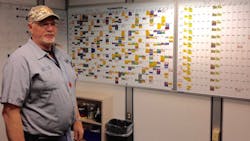2016 IW Best Plants Winner: From Zero to Lean in Record Time at Metform Group
For many businesses, the Great Recession was a time to cut back, but for Savanna, Illinois-based Metform Group, it was time to lay the groundwork for some serious growth. The division of MacLean-Fogg makes transmission gear blanks, fasteners and wheel nuts for the automotive and heavy equipment industries.
In 2010, leaders of the family-owned company decided to invest $13 million in a new Hatebur AMP 50, the Cadillac of hot-forming machines. They saw the market trending toward increasingly sophisticated transmission components for trucks. The new machine would allow them to manufacture gear blanks for 8 and 9-speed transmissions.
“They made this investment in the machine without having any business on it whatsoever,” says Metform President Dan Cavanagh. “It was quite a leap of faith, but we also knew in order to get to the levels we wanted to and have achieved, we needed that capacity.”
And the business arrived, in spades. Since 2009, Metform has transformed from a $40 million business to a $130 million business today.
But acquiring the new machine was just the beginning of the transformation. Cavanagh, a 32-year automotive industry veteran who was president of Dana Corp. and has held high-level positions at Magna and Cooper Standard, came on in 2013, as the company opened its new machining plant. With Cavanagh’s arrival, Metform also began a lean transformation that in the past year has resulted in the entire 400-person workforce completing lean basic training, with 95% certified so far.
Lean classes were cross-functional, involving people from different shifts, different buildings and different roles. “It ended up being a strength,” says Cavanagh. “We developed relationships between the different processes.” Leadership read and discussed the kata book together, a chapter at a time, and benefitted from a lean mentor brought in to help them master their coaching technique.
Walk through one of Metform’s four plants within a 15-mile radius, and there’s a palpable excitement about the lean shift—a shift from putting 10 to 12 people on a problem to 5s and the kata process, from punitive attendance policies to an emphasis on individual responsibility and teamwork.
Shop-floor employees proudly show off their flow charts and visual aids with photographs they’ve taken, and explain step-by-step the process improvements they’ve made. Team leaders and supervisors, having completed a weeklong safety training course, now kick off their meetings with a safety moment, where a mini-orange cone is passed from person to person. Each shares a safety encounter they had in the past week, from putting bins in their rightful place to securing a stray extension cord that’s a trip hazard.
Maclean-Fogg Metform GroupSavanna, Ill. Employees: 417, non-union Total Square Footage: 380,000 Primary Product/Market: Hot-forged fasteners and gear blanks Start-up Date: 1976 Achievements:41% decrease in OSHA recordable incidents in the past three years, 21.8% increase in productivity in the past three years, 99% on-time delivery. |
Metform’s newest site, called M1, houses the machining operation for the company’s major automotive eight- and nine-speed transmission applications. Metform had 8 months after it secured the contracts for those jobs to get the site up and running.
“It’s very precise machining,” says Cavanagh, noting that tolerances keep getting tighter and tighter, down to microns. He’s still amazed by the fact that they were able to “bring in 120 people who have never run CNC machines and launch this without any major disruptions.”
For the new workforce, they recruited from their base of long-term employees and hired a full-time instructor—a math teacher from one of the local high schools—to assess new hires and structure individual training to get them up to speed. They tapped into a community college in Clinton, Iowa, with an electronic tech program to identify and work with potential recruits.
They also picked up a few hires from competitors. “We were coming out of the recession and there were a lot of companies that didn’t rebound as quickly as we did,” says Cavanagh.
Since the start of production, equipment downtime has declined 67% in the new plant. To keep the Hateburs running, teams have learned through the lean implementation to better plan downtime and maintenance. Color-coded daily master calendars lay out the schedule for identifying and fixing issues in a deliberate, step-by-step fashion over the entire year. Daily standup meetings keep the communication flowing.
“Fifteen years ago, the process was, ‘Let’s take one machine down every year and rebuild it to brand-new factory specs,” says Cavanagh. “We’ll invest a ton of money, and it’ll be down almost a year. We had no resources to do normal maintenance for other machines. Now we’re attacking things as they come up and plan them across all machines, and invest the time and money to do that.”
About the Author

Laura Putre
Senior Editor, IndustryWeek
As senior editor, Laura Putre works with IndustryWeek's editorial contributors and reports on leadership and the automotive industry as they relate to manufacturing. She joined IndustryWeek in 2015 as a staff writer covering workforce issues.
Prior to IndustryWeek, Laura reported on the healthcare industry and covered local news. She was the editor of the Chicago Journal and a staff writer for Cleveland Scene. Her national bylines include The Guardian, Slate, Pacific-Standard and The Root.
Laura was a National Press Foundation fellow in 2022.
Got a story idea? Reach out to Laura at [email protected]
